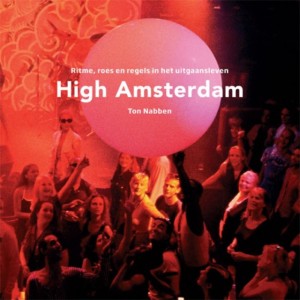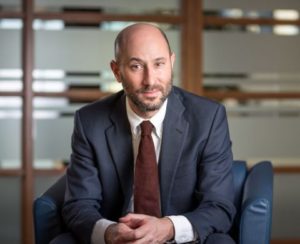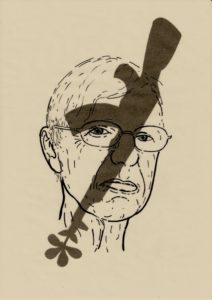High Amsterdam ~ Bijlage Muzieklexicon & Literatuurlijst
Acid house: Acid house is ontstaan in de jaren tachtig in Chicago, toen producers de nieuwe Roland TB-303 Bassline in de eerste houseproducties gebruikten. Dit maakt het mogelijk dance-tracks te maken die voornamelijk bestaan uit een telkens herhaalde baslijn en een drumritme. Het metronoom-strakke samenspel tussen drumcomputer en bascomputer zorgt voor een hypnotiserend effect.
BP M: Beats per minute, de tempoaanduiding die het aantal ‘beats’ (slagen) per minuut weergeeft.
Dance: Hoewel veel popmuziek betiteld kan worden als dansmuziek, heeft dance als genre sinds de jaren tachtig specifiek betrekking op grotendeels elektronische muziek die speciaal bedoeld is om de dansvloer vol te krijgen en zich richt op de clubcultuur. De meeste dance-stijlen kenmerken zich door eenvoudige, repeterende melodieën met een prominente bass-drum, in een vierkwartsmaat gespeeld.
Hardcore: De hardste, snelste en meest duistere van alle housestijlen. Vroeger bekend als gabber, nu ook als hardstyle.
Hiphop: Levensstijl én muziekstijl ontstaan in de jaren zeventig in The Bronx. De vier elementen die het fundament van de hiphop vormen: mc’ing, dj’ing, breakdance en graffiti. Schokkerige, funky muziekstijl die geconcentreerd is rond het rappen en waarin vaak gebruik wordt gemaakt van samples.
House: Verzamelnaam voor elektronische dansmuziek. Tegenwoordig ook: een specifieke stroming die het
meeste lijkt op de originele housemuziek uit Chicago, waarbij de nadruk minder op de elektronische instrumenten ligt en meer op de ‘groove’ en de vocalen.
Minimal: Subgenre van techno dat zich onderscheidt door lage basmelodieën, subtiele veranderingen, klikgeluiden en complexe vierkwarts beats. De kick is minder belangrijk dan bij techno. Opvallend is de gelijkwaardigheid van samples en geluidsfragmenten, waarbij alle componenten onmisbaar zijn voor de algehele ‘groove’.
Techno: Monotone ritmes, abstracte melodieën en het ontbreken van vocalen zijn de kenmerken van deze gecomputeriseerde muziek.
Tekno: Keiharde, compromisloze en psychedelische variant van hardcore, populair op illegale feesten.
Trance: Pompeuze house met dwingende vierkwartsmaat die wordt begeleid met dromerige melodieën en psychedelische effecten, afgewisseld met drumclimaxen.
Urban: Letterlijk: stedelijk. In Nederland containerbegrip en (nieuwe) verzamelnaam voor een commerciële, melodieuze en dansbare mix van R&B, rap en hiphop, mode, straatcultuur en glamour. Populair onder allochtone jongeren. Read more
US Leaders Can Now Be Prosecuted For Illegal War
War is gathering around the world, and autocratic leaders are undermining the legal checks on their discretion to launch attacks abroad. With the rule of law under threat, the International Criminal Court recently defined and activated for prosecution a new crime called the “crime of aggression.” The crime of aggression — leadership responsibility for planning, preparing, initiating or waging illegal war — has begun to permeate international, regional and national legal systems around the world. But in an age of drones, cyberattacks, insurgents and autocrats, is it too little, too late?
Noah Weisbord — an associate professor of law at Queen’s University and the author of The Crime of Aggression: The Quest for Justice in an Age of Drones, Cyberattacks, Insurgents, and Autocrats — served on the International Criminal Court’s working group that drafted the crime of aggression.
In the exclusive Truthout interview that follows, Weisbord discusses the legacy of the Nuremberg trials and the ways in which Donald Trump may have already violated international law by engaging in crimes of aggression.
C.J. Polychroniou: The Nuremberg trials, held between 1945 and 1949, represent a milestone in the development of international law. Yet, while many serious war crimes have been committed since the end of World War II, we have not seen war crimes tribunals taking place under similar ideal circumstances as those held in the Bavarian city of Nuremberg. In that context, what has been the legacy of the Nuremberg trials?
Noah Weisbord: The Nuremberg legacy is really about subjecting individual leaders to the rule of law in international affairs. Individual criminal responsibility is a grave threat to authoritarian leaders, which is why they do all they can to weaken and delegitimize the International Criminal Court [ICC].
Nuremberg prosecutor Robert Jackson was handpicked from the United States Supreme Court to work with English, French and Soviet counterparts to design the Nuremberg Tribunal and serve as its lead prosecutor. Jackson intended Nuremberg to serve as a model for a permanent international criminal court with worldwide jurisdiction, including over U.S. leaders. But the Cold War set in. The U.S. and the Soviet Union couldn’t agree on the design of an international criminal court, nor a prosecutable definition of Nuremberg’s “supreme crime,” the crime against peace — i.e., planning, preparing, initiating or waging a war of aggression — which is called the crime of aggression today.
The superpowers vied to design international laws that would serve as weapons against each other, stymying each other’s military advantages. During the Cold War, Nuremberg prosecutor Ben Ferencz, a key character in my new book, kept the dream alive. Ferencz advocated for an international criminal court and a prosecutable crime of aggression. Ferencz was wrongly overlooked as naïve and idealistic during this period.
But the end of the Cold War saw the rebirth of the Nuremberg idea, which began to spread worldwide: in the Yugoslav Tribunal; Rwanda Tribunal; Special Court for Sierra Leone; Extraordinary Chambers in the Courts of Cambodia; Special Tribunal for Lebanon; Special Panels of the Dili District Court; War Crimes Chamber of the Court of Bosnia and Herzegovina; Special Jurisdiction for Peace in Colombia; the Canadian, German, Belgian and French criminal courts; and grassroots “gacaca” justice in Rwanda. Read more
Noam Chomsky: To Make The US A Democracy, The Constitution Itself Must Change
Why do so many people in the U.S. today find Trump’s racist rants and authoritarian mindset appealing? What are the political checks and balances — or lack thereof — that can ward off the impact of the Republican leadership’s disastrous policies? Is a constitutional crisis on its way? And how do we face the consequences of an administration that is essentially competing for the title of most dangerous organization in human history? In this exclusive Truthout interview, Emeritus Professor of Linguistics at MIT and Laureate Professor of Linguistics at the University of Arizona Noam Chomsky, who is widely regarded as one of the greatest thinkers of all time (ranking among the top 10 cited sources of all time, along with Plato, Aristotle, Shakespeare, Hegel and Freud), dissects Trump’s racist attacks, Trumpism and the current condition of the country in the second decade of the 21st century.
C.J. Polychroniou: According to popular conception, the United States is a “nation of immigrants,” although this formulation significantly excludes Native people — who were already here, and were subjected to colonization, displacement and genocide at the hands of European immigrants — and also excludes African Americans, whose ancestors were kidnapped and enslaved. When it is described as a “nation of immigrants,” the U.S. is often portrayed as a varied nation where people have the freedom to pursue their dreams of a better life while maintaining their own cultural, ethnic and religious distinctiveness or uniqueness. Yet, the truth of the matter is that inequality and oppression of the “Other” have been ongoing political and social realities since the origins of the republic. In fact, today we have a president in the White House who makes no bones about wishing to see non-white people, even elected representatives of the U.S. Congress, leave the country because they challenge the status quo and seek a United States with a more humane and democratic polity. Meanwhile, the very rich are enjoying political privileges like never before. Noam, what are some of the tangible and intangible factors that seem to be pushing the country — socially, politically and economically — backward rather than forward?
Noam Chomsky: Trump’s diatribes successfully inflame his audience, many of whom apparently feel deeply threatened by diversity, cultural change, or simply the recognition that the White Christian nation of their collective imagination is changing before their eyes. White supremacy is nothing new in the U.S. The late George Frederickson’s comparative studies of white supremacy found the U.S. to be almost off the chart, more extreme even than Apartheid South Africa. As late as the 1960s the U.S. had anti-miscegenation laws so extreme that the Nazis refused to adopt them as a model for their racist Nuremberg laws. And the power of Southern Democrats was so great that until ‘60s activism shattered the framework of legal racism — if not its practice by other means — even New Deal federal housing programs enforced segregation, barring Black people from new housing programs.
It goes back to the country’s origins. While progressive in many ways by the standards of the day, the U.S. was founded on two brutal racist principles: the most hideous system of slavery in human history, the source of much of its wealth (and England’s too), and the need to rid the national territory of Native Americans, whom the Declaration of Independence explicitly describes as “the merciless Indian savages,” and whom the framers saw as barring the expansion of the “superior” race.
Immigrants … were supposed to be white immigrants — in fact, basically “Anglo-Saxon,” in accord with weird racist myths of the founding fathers that persisted through the 19th century. That includes the leading Enlightenment figures. Benjamin Franklin urged that Germans and Swedes be barred because they were too “swarthy.” Thomas Jefferson was greatly interested in Anglo-Saxon language and law, part of his immersion in the “Saxon myth” that English democracy and law trace back to a pre-Norman Saxon period. The first Naturalization Act, 1790, restricted the option to whites, extended to ex-slaves after the Civil war. Read more
Antonie Ladan ~ Onmacht en oorlogsverlangen
Het verlangen naar oorlog komt voort uit onmacht, aldus psychiater Antonie Ladan in Onmacht en oorlogsverlangen. Onmacht is het meest fundamentele aspect van ons leven. We hebben voortdurend te maken met gevoelens van angst, woede en razernij en dan kan een ‘ver weg’ oorlog een grote aantrekkingskracht uitoefenen als kapstok voor onze emoties. Via o.a. Albert Einstein, Sigmund Freud, Gerard Reve, Donald Trump, Vladimir Poetin, Theresa May laat Ladan zien dat oorlog een geriefelijke kapstok kan bieden voor gevoelens van onmacht rond vele situaties waarin we hulpeloos zijn. Een oorlog kan als geroepen komen.
Oorlog kan daarmee iets zijn om naar te verlangen, maar alleen als de werkelijkheid van de oorlog ver weg is en vaag blijft. Als Nederland in oorlog is middels oorlogsmissies, is de afstand tot het front zo groot dat we er in onze dagelijkse leven weinig van hoeven te merken. Zo’n geriefelijke oorlog is ideaal om de gevoelens van haat en machteloze woede niet op elkaar te hoeven richten maar bij een gemeenschappelijke vijand onder te brengen, zodat we samen tegen de vijand kunnen zijn, aldus Ladan. Oorlog beantwoordt in psychologisch opzicht aan een behoefte.
We hoeven ons niet verantwoordelijk te voelen voor onze oorlogsinzet in Libië, Irak en Syrië en de schade die dat veroorzaakt. Er wordt niet veel geschreven over de ‘collateral damage’ van onze daden die voortkomen uit een machteloze verontwaardiging. Wij voelen ons niet verantwoordelijk voor onschuldige burgerslachtoffers en een sterke toename van geweld, chaos en destabilisatie. Wij hebben iets kunnen betekenen voor de buitenwereld, waardoor we ons minder machteloos voelen. De huidige manier van oorlogvoeren, met drones en lasergestuurde bommen, versterkt dat gevoel alleen maar. De afstand tot de daad van het doden wordt opnieuw vergroot.
Een oorlog die met deze wapens wordt gevoerd wordt nog geschikter als kapstok voor onze destructieve behoeften. De oorlogsvoering kan mistig blijven, zodat we ons niet hoeven te schamen. Het maakt ons leven in mentaal opzicht gemakkelijker. Read more
Noam Chomsky: “Worship of Markets” Is Threatening Human Civilization
 We live in dangerous times — no doubt about it. How did we get to such a state of affairs where democracy itself is in a very fragile condition and the future of human civilization itself at stake? In this interview, renowned thinker, Emeritus Professor of Linguistics at MIT and Laureate Professor of Linguistics at the University of Arizona Noam Chomsky, sheds light on the state of the world and the condition of the only superpower left in the global arena.
We live in dangerous times — no doubt about it. How did we get to such a state of affairs where democracy itself is in a very fragile condition and the future of human civilization itself at stake? In this interview, renowned thinker, Emeritus Professor of Linguistics at MIT and Laureate Professor of Linguistics at the University of Arizona Noam Chomsky, sheds light on the state of the world and the condition of the only superpower left in the global arena.
C.J. Polychroniou: Noam, looking at the current state of the world, I think it is not an exaggeration at all to say that we live in ominously dangerous times — and not simply in a period of great global complexity, confusion and uncertainty, which, after all, has been the “normal” state of the global political condition in the modem era. I believe, in fact, that we are in the midst of a whirlpool of events and developments that are eroding our capacity to manage human affairs in a way that is conducive to the attainment of a political and economic order based on stability, justice and sustainability. Indeed, the contemporary world is fraught, in my own mind at least, with perils and challenges that will test severely humanity’s ability to maintain a steady course toward anything resembling a civilized life.
How did we get to such a state of affairs, with tremendous economic inequalities and the resurgence of the irrational in political affairs on the one hand, and an uncanny capacity, on the other, to look away from the existential crises such as global warming and nuclear weapons which will surely destroy civilized life as we know it if we continue with “business as usual”?
Noam Chomsky: How indeed.
The question of how we got to this state of affairs is truly vast in scope, requiring not just inquiry into the origin and nature of social and cultural institutions but also into depths of human psychology that are barely understood. We can, however, take a much more modest stab at the questions, asking about certain highly consequential decisions that could have been made differently, and about specific cases where we can identify some of the roots of looking away.
The history of nuclear weapons provides some striking cases. One critical decision was in 1944, when Germany was out of the war and it was clear that the only target was Japan. One cannot really say that a decision was made to proceed nevertheless to create devices that could devastate Japan even more thoroughly, and in the longer term threaten to destroy us as well. It seems that the question never seriously arose, apart from such isolated figures as Joseph Rotblat — who was later barred reentry to the U.S.
Another critical decision that was not made was in the early 1950s. At the time, there were still no long-range delivery systems for nuclear weapons (ICBMs). It might have been possible to reach an agreement with Russia to bar their development. That was a plausible surmise at the time, and release of Russian archives makes it seem an even more likely prospect. Remarkably, there is no trace of any consideration of pursuing steps to bar the only weapons systems that would pose a lethal threat to the U.S., so we learn from McGeorge Bundy’s standard work on the history of nuclear weapons, with access to the highest-level sources. Perhaps still more remarkably, there has, to my knowledge, been no voiced interest in this astonishing fact. Read more
We Need A Green New Deal To Defeat Fascism And Reverse Inequality
In the debate about what strategy to adopt to combat climate change, the Green New Deal has quickly become the new buzzword on the left. Is it an insufficient social-democratic response to the present crisis, or is it, in fact, the only realistic project we have to save the planet? Robert Pollin, distinguished professor of economics and co-director of the Political Economy Research Institute at the University of Massachusetts at Amherst, is a leading proponent of a green future and he shared his vision of the Green New Deal in the interview below, which appeared originally in Swedish in the left paper Flamman.
Jonas Elvander: You are one of the most well-known scientific spokespersons for a so-called “Green New Deal.” Can you explain what that means?
Robert Pollin: In my view, the core features of the Green New Deal are quite simple. They consist of a worldwide program to invest between 2-3 percent of global GDP every year to dramatically raise energy efficiency standards and equally dramatically expand lean renewable energy supplies.
Here is why this is the core of the Green New Deal. Last October 2018, the Intergovernmental Panel on Climate Change (IPCC) issued a new report emphasizing the imperative of limiting the rise in the global mean temperature as of 2100 by 1.50C [1.5 degrees Celsius] only, as opposed to 2.00C. The IPCC now concludes that limiting the global mean temperature increase to 1.50C will require global net CO2 [carbon dioxide] emissions to fall by about 45 percent as of 2030 and reach net zero emissions by 2050. These new figures from the IPCC provide a clear and urgent framework for considering alternative approaches for fighting climate change.
To make real progress on climate stabilization, the single most critical project at hand is straightforward: to cut the consumption of oil, coal and natural gas dramatically and without delay, and to eliminate the use of fossil fuels altogether by 2050. The reason this is the single most critical issue at hand is because producing and consuming energy from fossil fuels is responsible for generating about 70 percent of the greenhouse gas emissions that are causing climate change. Carbon dioxide (CO2) emissions from burning coal, oil and natural gas alone produce about 66 percent of all greenhouse gas emissions, while another 2 percent is caused mainly by methane leakages during extraction. Read more






